Saturday, February 25, 2006
Coffee the Aussie Way
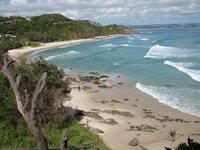
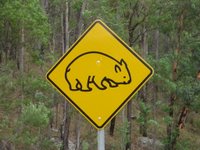
We recently spent 3 weeks on holiday in Australia and having heard so much how the coffee culture was so dynamic down there, I was interested to find out the truth behind the hype. We also had an opportunity to visit boutique coffee plantations in some mountain areas of South Eastern Queensland, my first experience of coffee growing in the "first world".
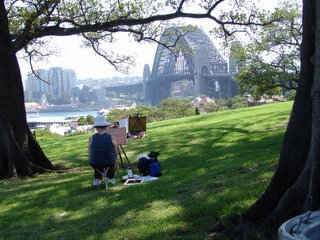
Starting off our holiday with four days in Sydney, I was eagerly anticipating my espresso experiences in a city that reputedly ranks with Seattle and Auckland as one of the best cities outside Italy to taste the form of coffee that I am most passionate about.
I should lay my prejudices out on the table as these of course qualify my opinions. Firstly I believe freshness is everything - in the roast, the grind and in the serving of the cup. Years of practise mean you can taste deficiencies of freshness that can be present from each stage in the espresso, as well as the numerous other major and minor mistakes a barista can make in the illusive search for the "perfect" shot. Reports of Sydney's small roasters, highly trained baristas and flourishing independent espresso bar scene gave me elevated expectations with just a hint of suspicion.
Most stories of how good (sorry, how much better than UK) the coffee was had after all come from Aussies. And usually "flat white" requesting, but latte or cappuccino drinking, Aussies at that. That gave rise to the suspicion. Was Australia just the land of the "best milk texturers" or even just better milk or was I truly going to find espresso nirvana in the land where the crema swirls the other way?
The first experience, believe or not, was in a Starbucks on Darling Harbour, so we won't count that - it was a sunday morning after all and the local coffee shops near our aparthotel in Chippendale were all shut.
Monday morning I was pretty buoyant - after all I had spent a highly pleasurable sunday afternoon and evening with 35,000 Aussies - watching Sri Lanka give them a right tonking in a day night one day cricket match, whilst drinking something yellowish, ice cold and slightly sickly that they call beer. How does VB get away with calling that stuff "bitter"? The first espresso came at about 8.30 am - small breakfast / sandwich kiosk on an urban thoroughfare behind the main railway station. I tried to go for the jugular by ordering a "double ristretto" ready to have to explain what I meant as you do in the UK, but the young lady who was pulling shots, steaming milk whilst somehow producing copious quantities of raisin toast didn't blink. The crema looked a bit yellowish and she re-made it without me prompting. It was well - good, more than acceptable and when asked they told me that the coffee was roasted by an independant in Surrey Hills, no more than 3 miles away. I thought, well probably a fluke. But it was decent - very classically Italian style espresso, made and served with care
The menu interested me though.
Short Black
Flat White
Long Black
Macchiato
Affogato
as well as all the familiars. Apart from Macchiato these were unfamiliar if easy to guess.
And what were these delights : Raisin Toast, Tuscan Toast with scrambled eggs, Filled Turkish bread, Cheese and Tomato Croissant, Toasted Muesli with Honey, Yoghurt and fresh fruit.
All these items re-appeared with regularity all around Sydney, and I had to admit that the average Aussie espresso bar seemed to have more "stuff" that I might want to eat as an "all day breakfast" than I could get at home. Also it did not appear to be uncool to order a bacon and egg roll with a double shot soy latte!
The first experience was generally speaking mirrored - a little better or worse perhaps - each time I ordered. You often had to wait at a table and have it brought to you five or ten minutes later, but the quality generally reflected the fact that people's expectations were high and there was plenty of competition. Indeed in some neighbourhoods there seemed literally to be an independent coffee house or deli-cafe on every corner.
I was happy - but there was no real wow. We make better coffee consistently, I thought smugly, but then again we should.
And then I found Toby's Estate.
And was served one of the finest coffees I've ever tasted out of an espresso machine.
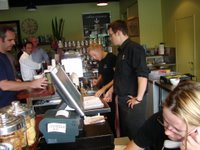
I'd heard of them already of course and thoroughly enjoyed the hour or so we spent there. Chris allowed me to disturb some of his roasting time - which was kind - and the quality / freshness / imagination ethos permeated their City Road roastery / coffee house and store. Seeing beans being sold out of hoppers with roast dates on them and learning that 4 day old coffee is considered "past it's best", reinforced the evidence of an uncompromising attitude that is the only fair way for the roaster-retailer to treat truly exceptional green coffee.
The double ristretto exhibited coffee-sympathetic barista skills of the highest order and unusual flavour notes had me guessing at the blend. It's quite obvious that a speciality roaster in Oz will tend to favour PNG and Indonesian Coffees due to simple geographic proximity, but I think Toby's are using them more imaginatively than anyone else. Power to them.

"Out of Sydney and overall quality slipped a bit" would be my very subjective comment, but we still often drank coffee in towns of 4-5000 inhabitants which was quite acceptable. And very rarely were we obliged to resort to a chain. Almost never in fact.
In Brisbane we had very good coffee twice - once at a Merlo Coffee in-house coffee bar, and here was another roaster who advertised freshness, guaranteeing daily deliveries from their roastery in the suburbs to their own stores. But it wasn't on Toby's level and on our last day in Australia I had to engineer a visit back to Toby's to set me up for the 21 hours in a 747. Thanks guys!
Strangely I never got the impression that Australia's espresso roasters use much Australian native coffee. This was a surprise at first, but given the price of the stuff and it's lack of any characteristic you can't get from elsewhere, it is perhaps understandable. You could buy native coffee in some shops, most often in the area around Byron Bay, but I got the feeling that it was all a bit of a tourist focussed gimmick. (I'm trying not be patronising here, but I still can't really understand the economics. Perhaps it is a function of Australian can-do pioneering enthusiasm combined with a love for coffee.)
Perhaps it doesn't need me to point it out, but growing coffee is back-breaking hard work, especially at harvest time. Fairtrade issues aside, you wouldn't grow it unless it was the best economic use of the land or provided a long term economic benefit. It is very hard to automate most parts of the processing during and after harvest and certain volumes are needed to justify the expensive processing equipment. Hence the presence of private mills and co-operatives in most producing countries that share resources between many individual growers. Nothing I saw in the coffee growing areas of S.E. Queensland and N.E. New South Wales was able to convince me that growing coffee was not a lifestyle, rather than economic decision. One of the farms I visited on Tambourine Mountain was run by a couple who seemed to be dreading the rigours of picking all the crop themselves. Maybe the avocadoes growing a mile away, the vineyard down the valley or macadamia trees might have been a better bet - at least there wouldn't have been so many snakes under the trees!
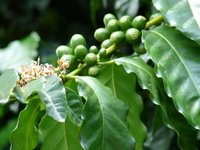
Now I know there is Skybury and Mountain Top, larger operations with reputations and global marketing, but why should the coffee drinker pay 2-3 times the price of a fine Costa Rica or Kenyan for 1st world coffee? And that initial troubling question is still unanswered - if it was THAT good why aren't the local roasters snapping it all up long before it gets near a sealed 20 foot container? As a nation they are patriotic to a fault (no polite applause for an opposition 6 at the SCG, mate!), but not in their coffee. Needless to say, we've no plans to stock any "fair dinkum" coffee any time soon.

There's really only one thing I genuinely missed in Aussie coffee and strangely the guys at Toby's agreed with me. I missed a decent cup of drip filter coffee. No coffee houses offered it and espresso machines were literally everywhere. Some coffees cannot be used in espresso and to exclude conventional forms of coffee from your market seems a bit obtuse.
But what do I know - just another whingeing pom? Their espresso standards are far higher than ours and I think I learnt a lot down under, especially about the benefits of investing in barista skills. Someone told me that per capita out-of-home coffee consumption in Australia has just moved above Italy. Now that is something to be proud of, as the market in the old days was dominated by the soluble monsters - a bit like here in fact.
Thursday, February 23, 2006
Hill & Valley Coffee back on the road
The new outdoor event season starts on the first weekend in March, with seven day weeks once again the norm for about 30 weeks. The mobile espresso bars are being cleaned and gently re-vamped and our Rancilio espresso machines are off for full services at CMC in London.
Sweet espresso shots, the freshest drip-filter coffee and "to die for" cakes when "The Coffeeman" hits your farm!
Once again we have a calendar stacked with British Eventing one day horse trials across the south of England and the Cotswolds, with a seasoning of 24 hour mountain bike action and a handful of selected other events.
New this year is a tie up with William Fox Pitt, to coincide with the launch of William's innovative Fox-Pitt eventing club. A relative veteran of the British international and olympic 3 day event teams, William is consistently the highest rated British rider internationally and a regular at our stand. If arrangements go according to plan the club marquee will be adjacent to our coffee bar at a dozen or so events, allowing our customers and club members to benefit from shelter as well as an introduction to club activities. If you are an eventing enthusiast, and looking for some enhanced spectator enjoyment and the chance to be involved with a developing horse without the costs of ownership, the club is an excellent idea. Full details by clicking the link above.
Weather permitting we can definitely be found at the following one day events before Easter.
March 4th - 5th. Stilemans, near Godalming, Surrey.
March 9th - 12th. Tweseldown Racecourse, near Fleet, Hants.
March 24th - 26th Gatcombe Park, near Minchinhampton, Gloucs.
March 30th - 31st Somerley Park, near Ringwood, Hants.
April 1st - 2nd Goring Heath, near Henley-on-Thames, Oxon.
April 8th - 9th Larkhill Camp, near Amesbury, Wilts.
As well as our own stand, hot and cold food concessions operate and there is usually an interesting country shopping village with an equestrian slant. Some of the courses provide the best sunday afternoon walk in the country you could ask for and dogs are usually welcome. In fact usually there seem to be more of these than horses!
For details on how to get to any of these events, check out the fixtures section of the British Eventing website.
Sweet espresso shots, the freshest drip-filter coffee and "to die for" cakes when "The Coffeeman" hits your farm!
Once again we have a calendar stacked with British Eventing one day horse trials across the south of England and the Cotswolds, with a seasoning of 24 hour mountain bike action and a handful of selected other events.
New this year is a tie up with William Fox Pitt, to coincide with the launch of William's innovative Fox-Pitt eventing club. A relative veteran of the British international and olympic 3 day event teams, William is consistently the highest rated British rider internationally and a regular at our stand. If arrangements go according to plan the club marquee will be adjacent to our coffee bar at a dozen or so events, allowing our customers and club members to benefit from shelter as well as an introduction to club activities. If you are an eventing enthusiast, and looking for some enhanced spectator enjoyment and the chance to be involved with a developing horse without the costs of ownership, the club is an excellent idea. Full details by clicking the link above.
Weather permitting we can definitely be found at the following one day events before Easter.
March 4th - 5th. Stilemans, near Godalming, Surrey.
March 9th - 12th. Tweseldown Racecourse, near Fleet, Hants.
March 24th - 26th Gatcombe Park, near Minchinhampton, Gloucs.
March 30th - 31st Somerley Park, near Ringwood, Hants.
April 1st - 2nd Goring Heath, near Henley-on-Thames, Oxon.
April 8th - 9th Larkhill Camp, near Amesbury, Wilts.
As well as our own stand, hot and cold food concessions operate and there is usually an interesting country shopping village with an equestrian slant. Some of the courses provide the best sunday afternoon walk in the country you could ask for and dogs are usually welcome. In fact usually there seem to be more of these than horses!
For details on how to get to any of these events, check out the fixtures section of the British Eventing website.
hvcoffee.com Coffee Stock News
By an administrative oversight we had left Deadline Blend back in the garage when we re-stored online ordering last week. It is now back in the catalalogue and remains available. Apologies to any of you who were distraught at the absence.
e.caffe is now all but out for the moment, but will be returning in the spring as we've just laid our hands on some new crop Java Kayumas Estate, which will also make a re-appearance in April.
We've re-inforced the fine washed arabicas catalogue with an estate Papua New Guinea Peaberry, which will appear from the beginning of March. The ever popular and versatile Sumatra Lintong will return at the same time, but stocks of Sulawesi Kalosi will run out in a couple of weeks and this coffee will probably not re-appear until April.
All new coffees coming in are of course the latest crops and we have high hopes of the return of some "wow" factor once the Java and Kalosi arrives.
It is going to be a pretty lean winter for Kenya lovers, I'm afraid, as I have decided to hold off any buying until 2006 new main crop samples are circulating. We will, as usual, be trying to get our hands on an extraordinary AA, whatever the price, but in the meantime why not console yourselves with the consistently excellent Ethiopia Yirgacheffe, which has again been re-stocked.
e.caffe is now all but out for the moment, but will be returning in the spring as we've just laid our hands on some new crop Java Kayumas Estate, which will also make a re-appearance in April.
We've re-inforced the fine washed arabicas catalogue with an estate Papua New Guinea Peaberry, which will appear from the beginning of March. The ever popular and versatile Sumatra Lintong will return at the same time, but stocks of Sulawesi Kalosi will run out in a couple of weeks and this coffee will probably not re-appear until April.
All new coffees coming in are of course the latest crops and we have high hopes of the return of some "wow" factor once the Java and Kalosi arrives.
It is going to be a pretty lean winter for Kenya lovers, I'm afraid, as I have decided to hold off any buying until 2006 new main crop samples are circulating. We will, as usual, be trying to get our hands on an extraordinary AA, whatever the price, but in the meantime why not console yourselves with the consistently excellent Ethiopia Yirgacheffe, which has again been re-stocked.
